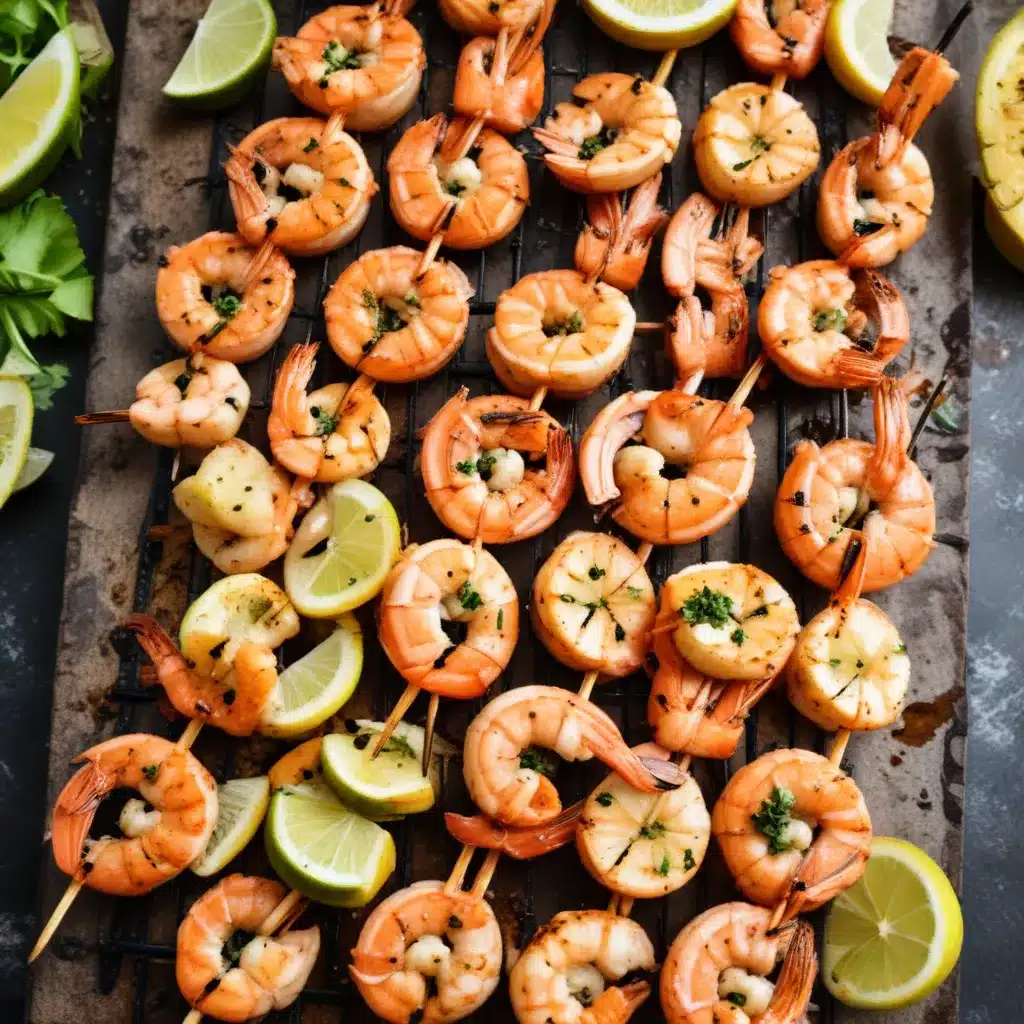
Grilling shrimp skewers is an easy, flavor-packed way to enjoy a quick seafood meal or appetizer. With just a few simple tips, you can master the art of perfectly grilled shrimp every time. Whether you’re hosting a backyard barbecue or looking for a fast and healthy weeknight dinner, these shrimp skewers are sure to satisfy.
Shrimp Grilling Fundamentals
Shrimp Selection
The key to delicious grilled shrimp starts with choosing the right shrimp. Fresh, high-quality shrimp are ideal, but you can also use frozen as long as they are fully thawed and patted dry before marinating. Opt for large or jumbo-sized shrimp, which will hold up best on the grill. Peeled and deveined shrimp also make for easier prep and more even cooking.
Skewer Preparation
If using wooden skewers, be sure to soak them in water for 30-60 minutes before threading the shrimp. This prevents the skewers from burning on the hot grill grates. Metal skewers also work well and can be reused. When threading the shrimp, leave a small gap between each one to allow for even cooking.
Seasoning and Marinades
Shrimp take on flavors beautifully, so don’t be afraid to get creative with your seasoning blends and marinades. A simple combination of olive oil, lemon zest, garlic, and dried herbs like oregano or basil makes for a bright, Mediterranean-inspired marinade. For a Cajun twist, try a blend of paprika, chili powder, and cayenne. You can also use prepared pesto or garlic butter for a quick flavor boost.
Grill Setup for Shrimp Skewers
Charcoal or Gas Grill
Both charcoal and gas grills work well for grilling shrimp skewers. Charcoal grills provide that classic smoky flavor, while gas grills offer easy temperature control. Preheat your grill to medium-high heat, around 400-450°F.
Temperature Control
Shrimp cook quickly, so maintaining the right temperature is crucial. Aim for direct, high-heat grilling, keeping the grill lid open to avoid overcooking. Use a grill thermometer to monitor the temperature and make adjustments as needed.
Direct vs Indirect Heat
For shrimp skewers, you’ll want to use direct, high-heat grilling. This means placing the skewers directly over the heat source. Avoid indirect, low-heat grilling, as the shrimp may end up dry and rubbery.
Shrimp Skewer Techniques
Threading the Shrimp
When threading shrimp onto the skewers, fold each piece in half and slide it onto the skewer, with the tail curling outward. This helps the shrimp cook evenly and prevents them from spinning on the skewer.
Spacing and Arrangement
Leave a small gap between each shrimp on the skewer, allowing for even cooking. Arrange the skewers in a single layer on the grill grates, making sure they aren’t crowded.
Turning and Monitoring
Shrimp cook quickly, so keep a close eye on them. Grill for 2-3 minutes per side, turning the skewers with tongs or a spatula. Avoid using a fork, as it can tear the delicate shrimp.
Flavor Profiles for Grilled Shrimp
Spicy and Zesty
For a bold, spicy-sweet flavor, try a marinade with ingredients like chili powder, paprika, cumin, and a touch of honey or brown sugar. Add a squeeze of fresh lime juice before serving.
Herbs and Citrus
Bright, herbaceous flavors pair beautifully with grilled shrimp. Try a marinade with fresh parsley, basil, oregano, and lemon or orange zest.
Garlic and Butter
For a classic shrimp scampi-inspired flavor, toss the cooked shrimp skewers with melted garlic butter or a drizzle of lemon-garlic sauce.
Shrimp Skewer Doneness
Visual Cues
Shrimp are cooked through when they turn from gray and translucent to opaque and pink. The tails should also turn bright red.
Internal Temperature
Use an instant-read thermometer to ensure the shrimp reach an internal temperature of 120-130°F. This ensures they are cooked through without becoming rubbery or overcooked.
Texture and Juiciness
Perfectly grilled shrimp should be slightly firm to the bite, with a tender, juicy interior. Avoid overcooking, which can lead to tough, dry shrimp.
Serving Grilled Shrimp Skewers
Presentation Ideas
Arrange the grilled shrimp skewers on a platter or serving dish, garnished with fresh herbs, lemon wedges, or a sprinkle of coarse sea salt. You can also serve them directly on the skewers for a more casual, hands-on dining experience.
Accompaniments
Grilled shrimp skewers pair well with a variety of sides, such as roasted vegetables, rice or quinoa, fresh salads, or crusty bread for sopping up any delicious juices.
Sauce Pairings
Consider serving the shrimp skewers with dipping sauces like garlic aioli, pesto, chimichurri, or a zesty remoulade.
Shrimp Skewer Storage and Leftovers
Refrigeration
Cooked shrimp skewers can be stored in the refrigerator for up to 3 days. Be sure to refrigerate them in an airtight container or wrapped tightly in plastic wrap.
Reheating Methods
To reheat, you can place the shrimp skewers on a baking sheet in a 350°F oven for 5-7 minutes, or until heated through. Alternatively, you can gently reheat them on the grill for 1-2 minutes per side.
Repurposing Leftovers
Use any leftover grilled shrimp in salads, pastas, tacos, or fried rice dishes. You can also chop up the shrimp and mix them into dips, spreads, or omelets.
Safety Considerations
Handling Raw Shrimp
Always handle raw shrimp with care, keeping it chilled and separate from other foods. Wash your hands thoroughly after handling raw shrimp to prevent the spread of food-borne illnesses.
Grill Cleanliness
Before grilling the shrimp skewers, make sure your grill grates are clean and well-oiled to prevent the shrimp from sticking.
Food-borne Illness Prevention
Shrimp are highly perishable, so it’s crucial to keep them chilled and cooked to the proper internal temperature. Discard any shrimp that have a strong, unpleasant odor or are slimy to the touch.
Grilling shrimp skewers is a quick, easy, and flavorful way to enjoy seafood. With a few simple techniques and the right seasoning, you can master grilled shrimp and impress your family and friends at your next backyard gathering or weeknight dinner. Visit https://www.fishtalescafe.com for more seafood inspiration and recipes.

